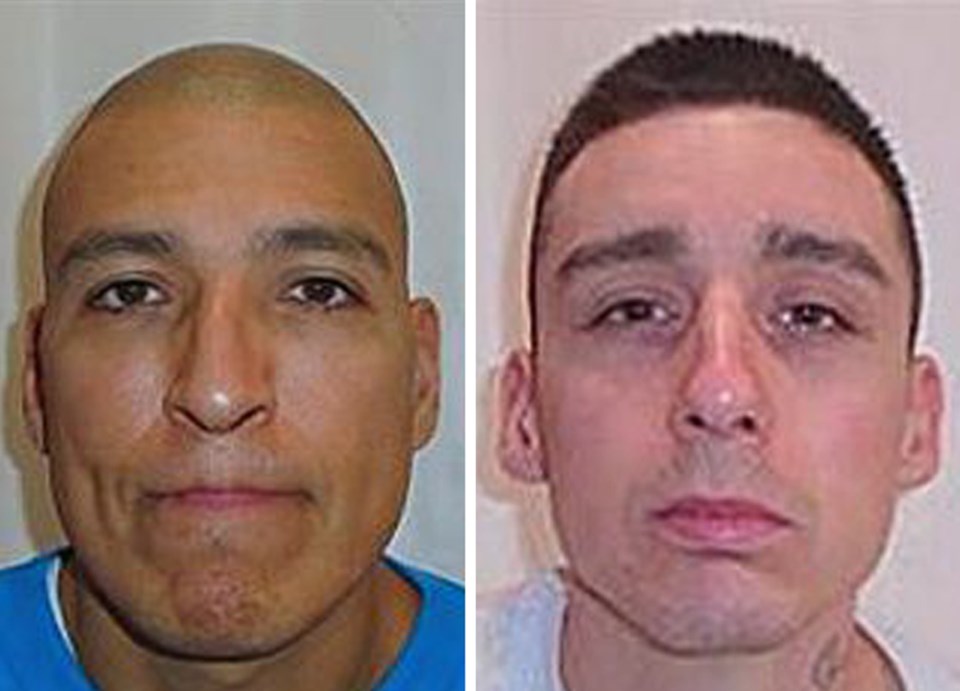Updated story: How off-duty police officer and his Great Dane helped in capture of 2 escapers
Two violent offenders who escaped from William Head were recaptured Tuesday night in the West Bay area of Esquimalt — not because of increased police patrols or security efforts, but because they commented to a dog walker on the size of his Great Dane.
The problem was that the dog walker was an off-duty cop.
The RCMP officer recognized the men as inmates James Lee Busch, 42, and Zachary Armitage, 30, who escaped from William Head at about 6:45 p.m. Sunday night. The RCMP officer called 911 while keeping a keen eye on the men, who had been on the run for three days.
Victoria police responded with “a heavy police presence and safely took the inmates into custody” at about 8 p.m., said West Shore RCMP Const. Nancy Saggar
Victoria police have turned the inmates over to West Shore RCMP. Armitage and Busch are still in police custody, said Saggar.
West Shore RCMP thanked the media, the Victoria Police Department, the off-duty officer and, of course, “Lewis the Great Dane,” saying all contributed to the capture of these “dangerous escaped inmates.”
On Tuesday, the violent crimes and escape history of the inmates raised questions among Metchosin residents about why the pair were in a minimum-security facility.
After the men were recaptured, Metchosin Mayor John Ranns said he was relieved.
Ranns said while he fully supports William Head’s program for inmates who are considered low-risk and has supported its work-release program where prisoners on conditional parole work in the municipality, “if they are going to have those types of offenders, maybe they should change the security [level].”
Ranns noted that during his 32 years on council, the prison has gone from medium to minimum security. He said he’s aware serious offenders are in the prison, but the escaped inmates didn’t seem to be close to re-entering the community.
William Head is surrounded on three sides by the Pacific Ocean and on one side there is an eight-foot fence. Years ago, there was a move to reduce the fence to four feet, but Metchosin council fought that, said Ranns.
The escapees were previously in maximum and medium security prisons but were sent to William Head because they were determined to be a “low-risk” to reoffend or escape by the Correctional Service of Canada.
William Head assistant warden Anthony Baldo said it’s important to differentiate between low risk and no risk.
“There’s no such thing as no risk but is it a manageable risk,” said Baldo.
“When an offender comes here we’re confident at that time that we can work further with that offender.”
The processes are tried and true, but human behaviour changes, said Baldo. “These two individuals specifically have demonstrated behaviour that will necessitate a re-review of their security placement and they will not be coming back to William Head Institution because they have shown an inability to reside at a low-risk security institution.”
On July 28, 2010, Busch pleaded guilty to second-degree murder for strangling Saskatoon neighbour Sandra Marie Ramsay, 41, over a $20 debt on May 14, 2010.
With another resident, Busch stuffed Ramsay’s body into a suitcase and dragged it to an alley trash bin. Busch was sentenced to life in prison with no chance of parole for 15 years. Busch earlier served seven years in prison for raping his seven-year-old female cousin.
In April 2009 in Sudbury, Ont., then 19-year-old Armitage beat Shaun Dupuis on the head with a blunt object. He robbed him and left him a quadriplegic and unable to speak. In 2011, Armitage pleaded guilty to aggravated assault and robbery and other charges. He was sentenced in a Sudbury court to 18 years in prison for his attack on Dupuis and for another violent robbery the same month in which he beat one of his victims unconscious. In February 2013, Dupuis died of an infection related to his injuries.
Both inmates have previously escaped from prisons.
William Head is a “releasing” prison. The Correctional Service of Canada is responsible for preparing every offender for potential conditional release back into the community, said Baldo.
William Head is a prison that inmates “step down” into after they have successfully completed several years of interventions and programs and have been assessed as low risk by the Correctional Service.
William Head is also purposely set up “to replicate a community” with houses and living units so that inmates can slowly “acclimate” to community-like living, said Baldo. “We want them to know how to live on their own in a law-abiding fashion.”
For the rehabilitation to work, there has to be a relationship between the community and the inmates, said Baldo.
He said staff at the prison and volunteers live and work in the community. They all have a vested interest, beyond believing in rehabilitation, to help inmates work to be better citizens and help them successfully reintegrate into society.
The public hears about escapees and reoffenders but less often hears about a greater proportion of federal parolees working successfully as law-abiding citizens in Victoria and the whole Pacific region, he said
ceharnett@timescolonist.com



